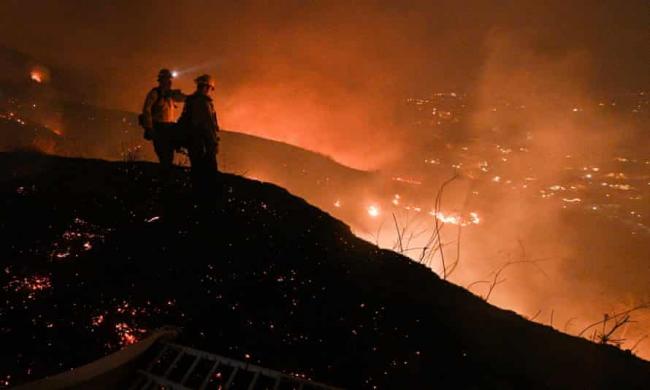Articles Menu

Jan. 14, 2021
Last year was by a narrow margin the hottest ever on record, according to Nasa, with the climate crisis stamping its mark on 2020 through soaring temperatures, enormous hurricanes and unprecedented wildfires.
The average global land and ocean temperature in 2020 was the highest ever measured, Nasa announced on Thursday, edging out the previous record set in 2016 by less than a tenth of a degree.
Countries adapting too slowly to climate breakdown, UN warns Read more
Due to slightly different methods used, the US National Oceanic and Atmospheric Administration (Noaa) judged 2020 as fractionally cooler than 2016, while the UK Met Office also put 2020 in a close second place. The European Union’s climate observation program puts the two years in a dead heat.
Regardless of these minor differences, all the datasets again underlined the long-term heating up of the planet due to the burning of fossil fuels, deforestation and other human activities.
The world’s seven hottest years on record have now all occurred since 2014, with the 10 warmest all taking place in the last 15 years. There have now been 44 consecutive years where global temperatures have been above the 20th-century average.
Scientists said average temperatures will keep edging upwards due to the huge amount of greenhouse gases we are expelling into the atmosphere. “This isn’t the new normal,” said Gavin Schmidt, director of Nasa’s Goddard Institute for Space Studies. “This is a precursor of more to come.”
The record, or near-record, heat came despite the moderately cooling influence of La Niña, a periodic climate event. “While the current La Niña event will likely end up affecting 2021 temperature more than 2020, it definitely had a cooling effect on the last quarter of the year,” said Zeke Hausfather, a climate scientist at Berkeley Earth, which found 2020 was narrowly the second hottest year on record.
“It suggests that we’ve added an equivalent of a permanent El Niño event worth of global warming in just the last five years,” Hausfather added, in reference to the counterpart climate event that typically raises temperatures. “Records like this further reinforce the need to reduce our emissions sooner rather than later.”
The climate crisis is drastically altering environmental processes across the globe, as the scientific analyses of 2020 show.
The annual average sea ice extent in the Arctic was, at 3.93m sq miles, the joint smallest on record, tied with 2016, while oceans were “exceptionally warm”, Noaa said, with just two previous years recording hotter marine temperatures. Average annual snow cover for the northern hemisphere was the fourth lowest on record.
Rising heat in the atmosphere and water is causing glaciers to melt, rising sea levels, as well as helping fuel larger and more destructive storms. The US, buffeted by an unprecedented Atlantic hurricane season in 2020, was hit with a record number of major disasters last year, costing tens of billions of dollars and resulting in several hundred deaths.
“Global warming won’t necessarily increase overall tropical storm formation, but when we do get a storm it’s more likely to become stronger,” said Jim Kossin, an atmospheric scientist at Noaa. “And it’s the strong ones that really matter.”
Wildfires, fueled by vegetation parched by prolonged heat, ravaged huge areas of California and Australia last year, while the Arctic experienced astonishing temperatures well above average.
“This year has been a very striking example of what it’s like to live under some of the most severe effects of climate change that we’ve been predicting,” said Lesley Ott, a research meteorologist at Nasa.
The UK Met Office has already predicted that 2021 will also be among the hottest ever recorded, with the world now “one step closer to the limits stipulated by the Paris agreement”, said Colin Morice, senior scientist at the Met Office. Governments will meet later this year in Scotland for crucial UN talks aimed at building upon the Paris deal, which committed countries to avoiding a disastrous global temperature rise of 1.5C from pre-industrial levels.
“We are headed for a catastrophic temperature rise of 3-5C this century,” warned António Guterres, secretary general of the UN. “Making peace with nature is the defining task of the 21st century. It must be the top priority for everyone, everywhere.”
[Top photo: Firefighters look out over a burning hillside in Yorba Linda, California, on 27 October 2020. Photograph: Robyn Beck/AFP/Getty Images]